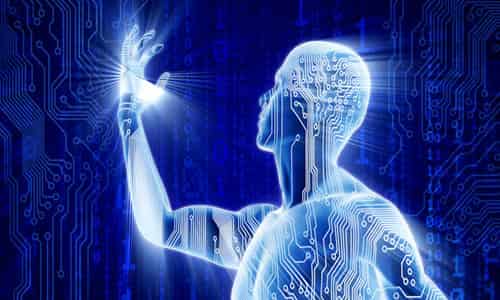Humanity 2.0: Transhumanists Push A New Human Order
 By PNW Staff April 11, 2017
Share this article:
By PNW Staff April 11, 2017
Share this article:
According to an official transhumanist website, Transhumanism is "a
class of philosophies of life that seek the continuation and
acceleration of the evolution of intelligent life beyond its currently
human form and human limitations by means of science and technology,
guided by life-promoting principles and values."
This
desire to advance beyond human nature has been powerfully embraced by
many among the technology and science elites of the world who welcome a
future of genetically enhanced, interconnected cyborgs who fit into
their perfect version of the future.
For others, this desire to play God sends shivers down their spines.
Though
transhumanism still sounds very much like science fiction, recent
advances in genetic manipulation and tens of billions of dollars now
invested in developing artificial intelligence have accelerated the pace
at which it is becoming a reality.
Some future watchers are already predicting the upgrading of humans will become the next billion-dollar industry.
The
famous futurist Ray Kurzweil, now employed by Google, believes that by
the year 2029 computers will have an intelligence equivalent to humans,
able creatively to solve abstract problems and interact in a way
indistinguishable from your average person.
At this point, computers will be used to design superior
versions of artificial intelligence and that second generation will
build a third generation in less time that is even more advanced.
As
each generation of machine, designed entirely by the previous
generation of machines, emerges both more quickly and more intelligent, a
sort of explosion in artificial intelligence happens.
That
is the singular point past which all of our current predictions fail.
Does humanity fade away or suffer extermination? Are we elevated by the
machines to levels we cannot dream of now, or pushed aside as obsolete?
This
elevation of humanity through technological singularity is the ultimate
goal of transhumanism, and to hear the transhumanist fanatics speak of
it, you would think they are fantasizing about becoming gods.
These
modern day Icaruses with their wings of silicon and genetically
modified DNA embody the godless essence of science today. Seeing
humanity as a broken machine, they tinker with it in an attempt to fix
God's creation.
A talk held in September of
2016 at Stanford University's Center for Science and Religion titled
"Transhumanism and the Church" addressed the issue of scientific hubris
and theological wisdom.
The 27 presentations
opened debate on questions of bioethics and the place of technology in
relation to the teachings of the Church.
Steve
Donaldson, a fellow at the University's Center for Science and Religion
stated that "Transhumanism's potential ramifications for the Church are
substantial."
He went on to ask the key
question, "Can a climate be created in which churches and people of
religious faith engage a transhumanist future positively or must the
Church resist? Is resistance futile?" He believes that transhumanism is
the next big scientific issue to face the Church.
Dennis
Sullivan, a medical doctor and director of the Center for Bioethics at
Cedarville University, a Baptist school in Ohio finds fault with the
transhumanist notion of improving on God's creation.
In
response to the attempts to improve humanity through genetic
engineering and implanting electronics inside the body he stated,
"Theologically, I always thought that was a slap in the face to God who
said that 'This is very good' in Genesis 1 after creating man. And
they're saying 'Not so good, and in fact we can do better.' I find that
very, very arrogant."
Fay Voshell, who earned
her Masters of Divinity from Princeton Theological Seminary, points to
the level of control that a "unified consciousness" would give to the
corporate technology masters.
Embedding
microchips in our brains to connect everyone into a global intellect
would allow a level of control that would make every previous attempt at
totalitarianism pale in comparison.
Kurzweil's
vision of man-machine transhumanism equates to "a total erasure of our
God-given and unique human identities," in Voshell's opinion.
Just as cell phones and a constant connection to social
media quickly became the new normal, it isn't difficult to see how a
constant neural connection to a global mind-set could do the same in
another couple of decades.
And when genetically enhanced children begin out-competing unmodified offspring, the pressure there will mount as well.
Transhumanism
has at its core an atheistic belief in the imperfection of God's
creation and man's arrogant desire to assume the role of God.
Craig
Venter, one of the scientists credited with mapping the human genome,
said recently in an interview with the Wall Street Journal, "We're going
to have to learn to adapt to the concept that we are a software-driven
species and understand how it affects our lives. Change the software,
you can change the species, who we are."
Seeing
our bodies as hardware and our genetic code and minds as mere software,
these men believe they can engineer away from what is essentially
human.
Will we soon see Icaraus and his wings of wax melt or the tower of Babel, swaying unsteadily toward heaven, come crashing down?
It
is difficult to say, but one thing is for certain, with many billions
of dollars pouring into artificial intelligence research and genetics
with the explicit goal of modifying or replacing humanity as we know it
today, this may be one of the most important fights of our time.

No comments:
Post a Comment